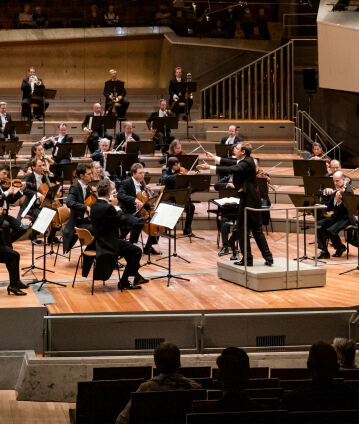Daniel Harding conducts Beethoven’s “Pastoral”

Alban Berg described his Lyric Suite as a “small monument to a great love”. In it, the composer musically encoded his passion for the married Hanna Fuchs, interweaving the tonal equivalents of the initials of them both, creating a highly personal piece of programme music. Beethoven’s symphony known as the “Pastoral” is also programme music, in which he expresses his love for nature – with bird calls, the splashing of streams and thunderstorms. A joyful homage to country life, conducted by Daniel Harding to mark the Beethoven anniversary year.
When Alban Berg set off for the international music festival in Prague in 1925 at the invitation of Hanna Fuchs-Robettin, he could not have imagined that this eight-day trip would unleash such an emotional turmoil: “Since this momentous event, I am no longer myself,” he confessed to his hostess afterwards, “only one thought, only one urge, only one longing animates me: that is you!”. The secret love affair lasted until the end of the year – and still echoes in Berg’s music today.
The Lyric Suite only revealed its explosive programme when the letters between Berg and Hanna Fuchs and a score with handwritten notes were discovered in the 1970s. Under the guise of the absolute music of a string quartet – the title of which is a reminiscence of Zemlinsky’s Lyric Symphony – Berg wrote down the disturbing memories from his soul. While the six-movement quartet traces the encounter from first meeting to painful renunciation, movements 2, 3 and 4, arranged for string orchestra by Berg in 1927, illuminate the amorous centrepiece of the liaison – with the climax of the passionate declaration of love in the Trio estatico. Disguised as an homage to the friend and dedicatee, Berg quotes a melody from the Lyric Symphony twice to the words “Du bist mein Eigen” (You are my own) and even the most astute analysts have not been able to track down the initials B (H in German)-F and A-B woven into the twelve-tone intertwined movement without the notes in the score.
Ludwig van Beethoven’s Pastoral is one of the best-known works that embellished abstract music with lyrical content. However, its programme was never a secret, and was publicised at the premiere with the title “Memory of life in the country”. One critic reacted with slight bewilderment at the time: “The path Beethoven has set for himself is indeed eccentric: he lifts us above the commonplace and transports us, although sometimes rather roughly, into the realm of fantasy.” For Beethoven, composition was a balancing act in which the music should never become a mere illustration of the programme. Although he took the liberty of imitating the calls of the cuckoo, quail and nightingale quite naturalistically, a musical menagerie as in Haydn’s Creation was far from his mind. Accordingly, he made it clear on the programme for the premiere that the symphony was “more an expression of feeling than painting”.
© 2020 Berlin Phil Media GmbH
Related interviews
Artists
Our recommendations
- Daniel Harding conducts Mahler’s Symphony No. 10
- Daniel Harding conducts Debussy, Ligeti, Sibelius and Britten
- Daniel Harding conducts Mahler’s First Symphony
- Daniel Harding conducts Holst’s “The Planets”
- Daniel Harding conducts Mahler’s Sixth Symphony
- Daniel Harding conducts “Thus spoke Zarathustra”